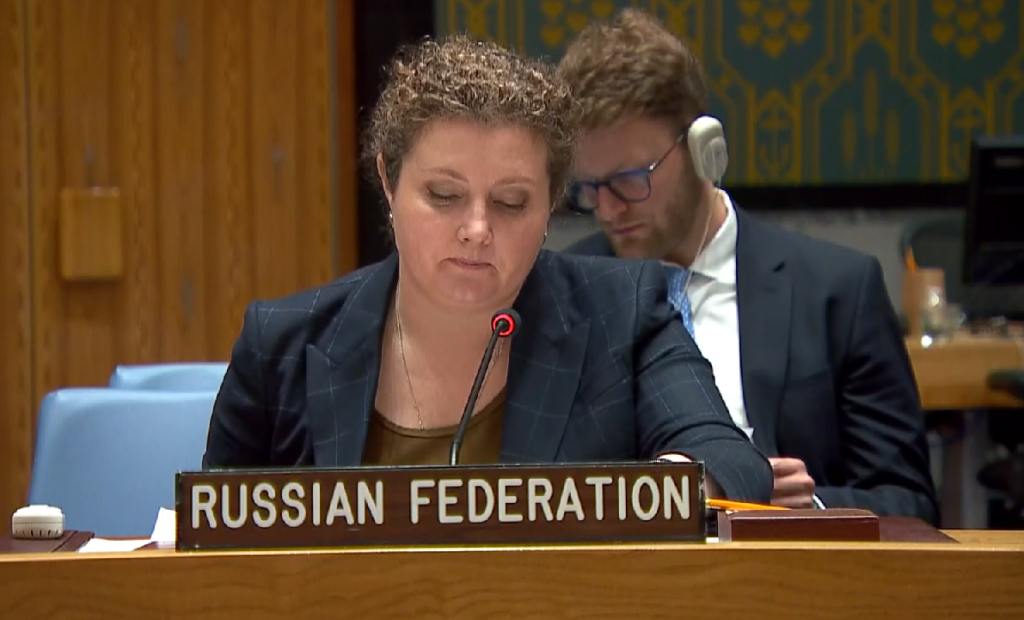Statement by Deputy Permanent Representative Anna Evstigneeva at UNSC briefing on the situation in the Central African Republic
Mr.President,
We thank SRSG Rugwabiza for the briefing. We welcome Minister of Foreign Affairs of the Central African Republic Sylvie Baïpo Témon, and the Permanent Representative of Rwanda to this meeting.
By our assessments, the situation in the Central African Republic remains relatively stable and under control of the governmental forces. Efforts are being undertaken to promote state presence in the country, strengthen administrative bodies, reform the security sector, implement a program for demobilization, disarmament, and reintegration of former combatants, boost the judicial system, and prepare for the local elections.
At the same time, in certain regions of the country, governmental troops still have to confront a number of illegal armed formations. We are convinced that bloodshed must stop and militia leaders must reject violent methods and embark on a robust dialogue with Bangui, because there is no alternative to the political and diplomatic settlement in the CAR.
We regard full-fledged implementation of the Khartoum Agreement and the Luanda roadmap as the prerequisites for achieving stability in the country. We underscore that against all odds, the authorities of the CAR are ready for an inclusive dialogue aimed at overcoming the security problems. The relevant meeting that was held in Bangui in September confirms this fact.
We also note that the Coordination Mechanism that was established upon the initiative of the CAR government keeps working. This mechanism, where the UN also takes part, allows to monitor the progress at the political track and coordinate the efforts of Bangui and the global community.
We welcome the active involvement of the International Conference on the Great Lakes Region (ICGLR) and the Economic Community of Central African States (CEEAC) in promoting the political settlement in the CAR, as well as the important role of the African Union in this process.
We welcome the work of the UN Multidimensional Integrated Stabilization Mission in the CAR (MINUSCA), which is a key factor of ensuring security in the country, one of the major elements of the efforts to counter the illegal armed formations and protect civilians. We are convinced that MINUSCA can implement its mandate completely only if it maintains a trust-based dialogue and has mutual understanding with host authorities. We thank the military from all troop-contributing states who risk their lives daily while performing their duties. We extend our condolences to the government of Bangladesh, as well as friends and families of the Bangladeshi peacekeepers who perished on 3 October.
Lasting stabilization and progressive development of the political process are not possible unless CAR receives effective support in capacity-building of national armed forces and law enforcement. They bear the main responsibility for protecting their homeland and its civilian population. We provide support and assistance to Bangui at this track.
Sanctions regime that is effective for Bangui needs to be further adapted. We believe that the arms embargo needs to be completely lifted. African representatives stick to the same opinion – I mean the African troika in the Security Council, as well as the African Union, and the ICGLR. Representatives of the CAR also underscore this on numerous occasions.
In conclusion, we would like to comment on what some our colleagues said today regarding Russia-CAR interaction.
Our position on that matter is well-known. We repeatedly elaborated on it at Security Council meetings. Russia has sent military instructors to the CAR upon request of the host government, of which UNSC Committee 2127 was notified accordingly. This cooperation yields considerable results in terms of training of Central African armed forces and stabilizing the situation in the country.
As for the choice of partnerships and alliances in any area, this remains the sovereign prerogative of national authorities, and same can be said about investigating the violations of human rights and IHL norms.
As a diplomat, I understand French national interests in Africa and the emotions that make French representatives say things that they said today. What I do not understand is what France is trying to achieve by endlessly repeating this misinformation, which sounds ever more contemptuous once we recall the history of France’s involvement in the region, and charges pressed for crimes committed by the French armed forces, i.a. in the Central African Republic. Africa does know and remember this. One thing I can say for sure – these claims, though repeated by a certain group of states in the Council, do not add to stabilization in the CAR.
Thank you.
